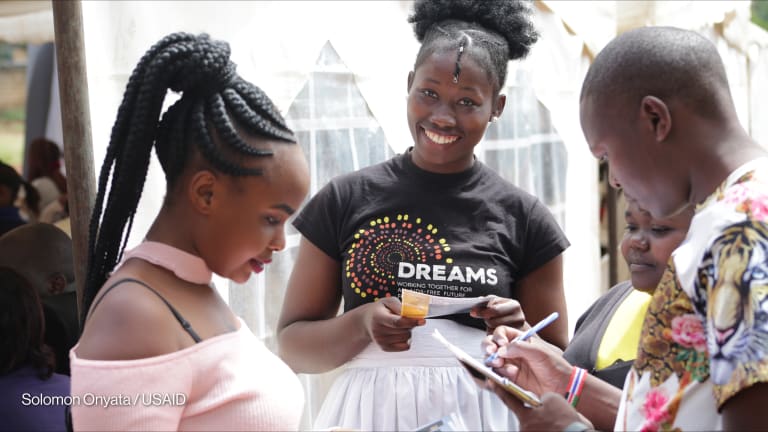Can moving HIV funding to faith groups help curb corruption in Kenya?

Lilian, a 20-year-old living with HIV, is determined to lead her community — in the informal settlement of Kibera in Nairobi — in fighting against biases that lead to loss of dignity and growth opportunities for people living with HIV. But stigma and discrimination against PLHIV is proving to be a persistent obstacle for her.
“The society is very hostile once they know your HIV status. They will discriminate, abuse, and do all sorts of things to you,” she said.
Lilian, whose name has been changed to protect her identity, was born with HIV. Her mother, whom she lives with, initially kept her condition from her and their community. But once friends and relatives discovered her status, they began to isolate her family.
“Very few of these NGOs connect directly with the community, yet they are the ones that receive development funding.”
— Erick Simba, director, Christian Best Camps of KenyaLillian has worked hard to prove there is life beyond being HIV positive. Together with a group of 14 other youths, she formed a support group that encourages peers living with HIV to have a positive outlook toward life and adhere to treatment.
But support groups such as Lillian’s fail to garner financial support from local authorities representing the national and county governments. Erick Simba, a pastor and a director at Christian Best Camps of Kenya, a faith-based organization operating in Kibera, said local authorities have shunned their social responsibility and instead refer PLHIV to religious organizations for support.
Simba said the resources meant to support HIV treatment and care have not been well managed by government authorities and proposed shifting funding for services for PLHIV to FBOs that already have a presence within communities in need.
“Right now there are people here who should be on HIV drugs and [getting] food to help with the medication but they do not get [them],” he said. “When they ask these leaders why they are not getting the services, they are referred to religious groups working with communities.”
There are around 1.5 million PLHIV in Kenya, and antiretroviral treatment coverage is pegged at roughly 75% for adults and 63% for children.
Simba said continued corruption in government could result in a shortage of supplies for PLHIV as it has previously led to low supplies for HIV treatment.
Part of our Focus on: Faith and Development
This series illuminates the role faith actors and their communities play in strengthening global development outcomes.
Last year, a standoff between the Kenyan Government and the U.S. Agency for International Development led to “dangerously low” supplies of ART in the country. A large batch of ART and other donated health supplies were left stranded at the port of Mombasa for six months as the two sides wrangled over which entity would distribute the drugs: Kenya Medical Supplies Authority or the U.S.-based private company Chemonics.
The dispute ended with both sides agreeing that the Mission for Essential Drugs and Supplies, an FBO that supplies health products to various entities in the country, would be responsible for distribution.
At the time, civil society organizations in Kenya speculated that USAID decided not to use the KEMSA for distributing the shipment because of allegations of corruption and mismanagement of COVID-19 funds.
According to Simba, the corrupt government system has also led to the mushrooming of “career NGOs” in informal settlements. In Kibera alone, there are over 1,000 charity groups working there, but they are never available to provide services such as HIV counseling and support, he said.
“Very few of these NGOs connect directly with the community, yet they are the ones that receive development funding,” he said. “They have connived with government officials so that their proposals are considered when donors partner with local administrations.”
Simba said a better solution would be for the government to partner with FBOs or for the donor community and government to fund FBOs as they already have a presence in Kenya’s development agenda.
But the Kenya Conference of Catholic Bishops said the role faith groups play in Kenya’s society should remain neutral of government and political influence.
“Religious groups have a responsibility to serve society. But they should be allowed to do this independently so as to objectively uphold values that make good leadership,” Archbishop Martin Kivuva, the chairman of KCCB, said. Adding that funding can compromise the independence of religious groups as they may be subject to political influence.
But for Simba, the fact that faith groups are in all sectors of the economy contributing to the building of the nation is a good enough reason for FBOs to be funded by the government.
“I know what it means to be marginalized, to live in poverty, and to miss a meal. When I get a chance to change a life I do it from the heart,” he said. “I urge policymakers not to shun us because we are a faith group. They are the ones who have access to resources.”
Devex, with support from our partner GHR Foundation, is exploring the intersection between faith and development. Visit the Focus on: Faith and Development page for more. Disclaimer: The views in this article do not necessarily represent the views of GHR Foundation.

Search for articles
Most Read
- 1
- 2
- 3
- 4
- 5


